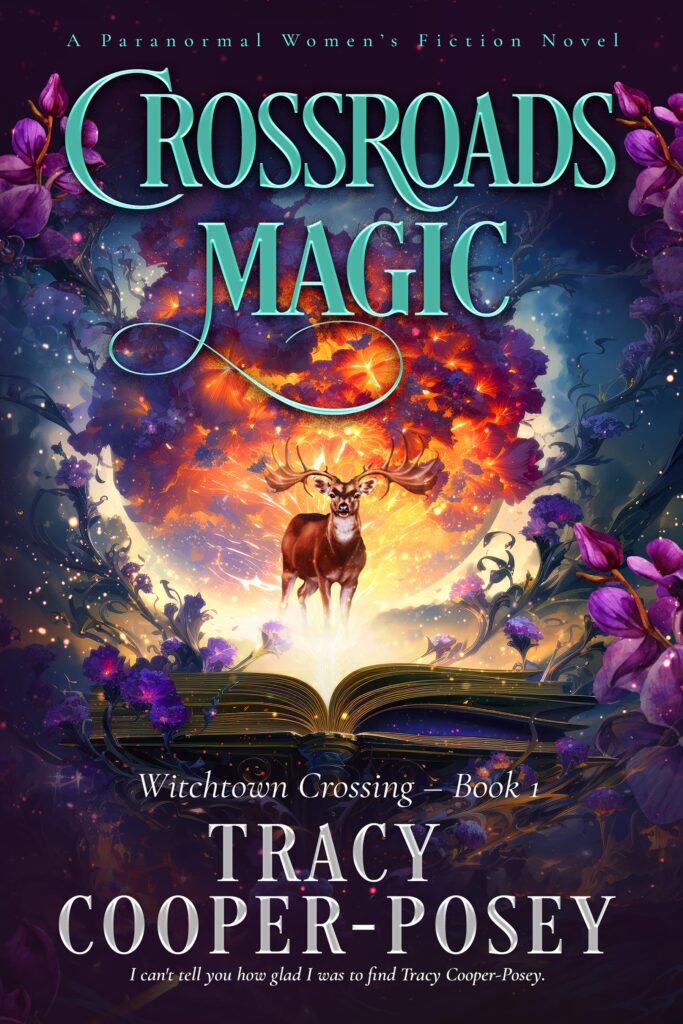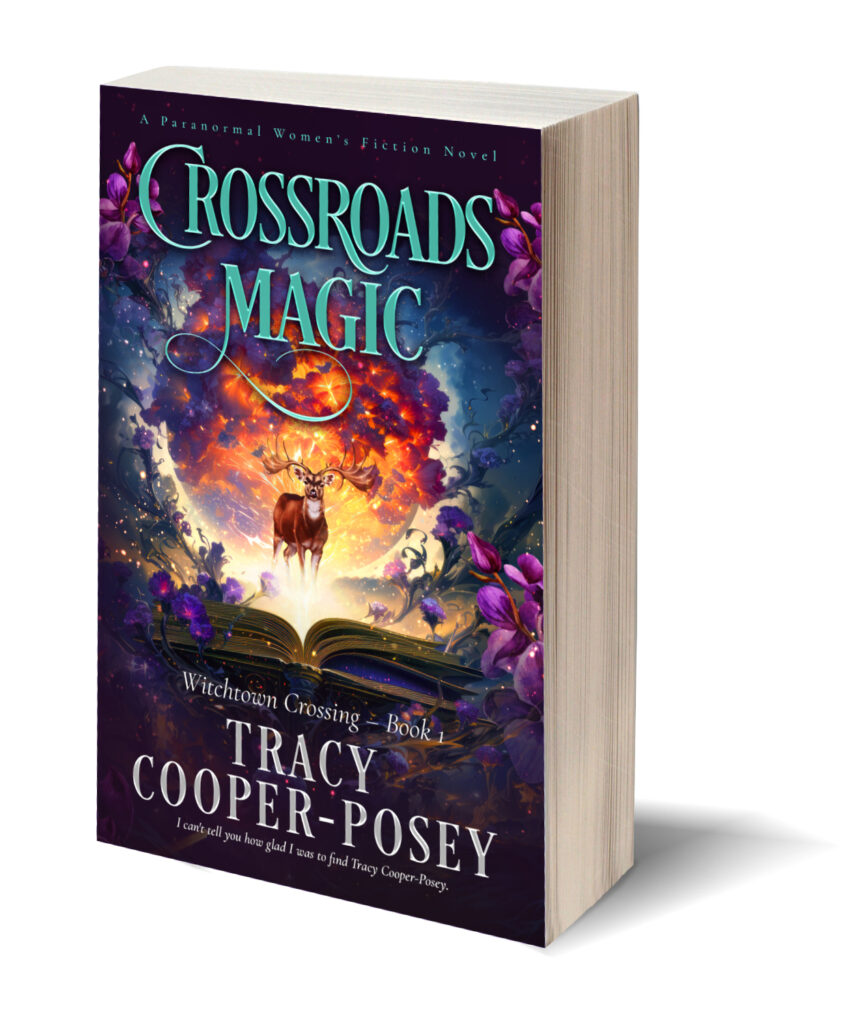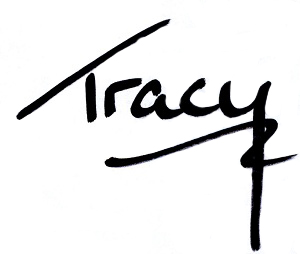
I’m just so in love with the cover for the first book in my new Paranormal Women’s Fiction novel, Crossroads Magic.
We’re two weeks away from the release of Crossroads Magic on Stories Rule Press. As usual, that means today, you can read the entire first chapter right here.
Chapter One
The only thing I was worried about as I headed back to my apartment building was the spot on the back of my hand where hot fat had left a burn the size of a nickel. Small, but mighty, the burn throbbed and ached, reminding me it was there. It was worse when the sun hit it, which it did frequently. It was one of those perfect, mild days in December, when you could actually see the sky over L.A. and it was blue.
Who am I kidding? The burn spot wasn’t the only thing I was worried about. If you were to ask me, I could rattle off a dozen major and minor problems, including the sumo-sized rat I suspect was trying to take up residence under my kitchen sink. But those were all chronic problems.
The burn on my hand was new and painful. I didn’t need new problems and was trying my best to ignore it until I could slather aloe vera gel on it. Marjorie, at the diner, had hacked off a leaf from the plant sitting in the pot outside the kitchen door when Deborah, the assistant manager, hadn’t been looking. Marj had wrapped the leaf in plastic. It was in my bag, along with the serving of pecan pie which Deborah had ordered the waitresses to throw out because it was too old. Three days old…there was nothing wrong with it, and it had more calories in it than the egg and toast I had lined up for dinner.
In this world that wasn’t the one I would voluntarily choose, today was turning out okay. Pecan pie, and Hobgoblin of History in my ears. I had been waiting weeks for book fifteen of M.K. Lint’s fantasy series. The library had doled it out to me yesterday and I was on chapter three. Harry the Hobgoblin was looking for the Fairy Eloise, this book; he’d lost her at the end of the last one, because he hadn’t closed the Doors of Eternal Flame in time and a demon had abducted her.
I like reading. I like it a lot.
My building was a white monstrosity that did nothing to enhance the L.A. skyline. The white had long ago turned to a stained, dull grey. Five years ago, a fire had broken out on the top floor and burned out a few apartments. The black smoke had billowed up out of the windows, staining the walls above them. The stains were still there and every time I saw them, I had to remind myself they were smoke stains, not black mold taking over the building. Black mold seemed more appropriate.
I turned off the audiobook, stashed my phone in my pocket and headed for the front door. I only used the front door when I came home from work. Usually, I used the side door, because it was closer to the bus stop.
There was another homeless person sitting on the front steps, leaning against the wrought iron banister as if they couldn’t prop themselves up, their jean jacket pulled in tight. It wasn’t that cold, although this late in the afternoon, any warmth in the day was beginning to fade.
I swung around the homeless person’s worn boots, and up the steps, digging out my key.
“Mom?” The voice wavered.
I whirled, my heart rate climbing, to face the woman rising from the steps, a denial on my lips.
Blue, short, spiky hair. A nose ring. Black eye makeup that had run…or that she had been wearing for too many days. The black looked like bruises.
“Ghaliya?” I asked, for the high cheekbones, narrow chin and high forehead were hers. So were the blue eyes—even if they were blood shot. The next question was right there, behind my teeth. What the hell are you doing here?
Ghaliya pulled the jacket in around her once more. She’d lost weight since the last time I’d seen her…two years, two months and five days ago. And about thirty minutes.
“The super said you’d be home around now,” Ghaliya said. She bent and picked up a small black backpack that had been sitting under her knees and straightened.
Was it possible she’d got taller? She’d been an inch shorter than me. I didn’t think she was shorter than me anymore, and I am nearly always the tallest woman in the room.
I didn’t ask why she was here. That was obvious. She needed help.
I hefted my keys instead. “You’d better come in.”
●
I live on the fifth floor. Apartments on the fifth floor and top floor got a 4% break in rent because the elevator didn’t work. It hadn’t worked since I had moved in.
Ghaliya was blowing like a bull by the time we stepped through the fire escape door into the hallway. I stopped, a touch concerned, and she put a hand on the wall, her head hanging down, and sucked in heaving breaths.
“You’re smoking now?” I asked her.
She lifted her chin and shook her head, still bellowing.
The man in the apartment across the hall from mine—late thirties, long hair, trimmed beard and nice teeth—an actor with a day job, I had guessed—strode down the hall toward the fire escape. He stepped around us, nodded at Ghaliya. The corner of his mouth lifted. “Hey.”
She nodded back.
I stared at him as he straight-armed the fire escape door and stepped through. I’d been living here for three years and he’d never once said a word to me. Not even a nod. I was invisible to him.
I’d become invisible not long after turning 40. Anyone scanning the area I was in would see all the younger women, and the men. Me, they’d dismiss as a middle-aged non-entity. After twelve years of not being noticed, I should be used to it. Yet every year it pissed me off just a little bit more.
Ghaliya straightened up from the wall. “I’m okay,” she told me. It took her two breaths to get it out.
I headed for the apartment, while selecting the key on my key ring, conscious of Ghaliya trailing behind me. She’d never been here, even though I’d taken the apartment the same month Jasper had announced our marriage was over. Ghaliya had chosen to stay with Jasper…although she had lived to regret the choice.
I pushed all the bitter old history out of my mind, unlocked the door and moved inside. I couldn’t help but compare the apartment to the house that Ghaliya and her brother, Oscar, had grown up in.
Ghaliya stepped in behind me, paused in the kitchenette and looked around.
I did, too, and saw the apartment the way she would see it.
The kitchenette was directly inside the door, with a miniature fold up table at the end, under the aluminum-framed window. Living area to the left of the door, that a full sized sofa couldn’t fit into. Bedroom off the living area, with a tiny bathroom coming off the bedroom.
I’d repainted the walls white, because they had been yellow from cigarette smoke when I moved it, and I’d hung cheap posters – I couldn’t afford frames. I’d studied the Ikea website pictures of tiny apartments for days when I’d first moved in. I could have Ikea-rized the guts out of this place and it would have been glorious, only I didn’t have a few thousand dollars to spare to buy all the furniture and bits and pieces it would take to turn the apartment into a tiny oasis.
I’d stretched to get a love seat and a bed, and had been slowly adding pieces here and there, most of them in a must-have priority order. Like coffee mugs. And a saucepan, as I like to eat hot, cooked food occasionally.
This morning’s dishes were still in the sink. Everywhere, on the floor, stacked up against the walls, and piled upon any flat surface, were my books, because bookcases were a luxury.
Ghaliya pulled her jacket in around her again. “Umm….”
Well, at least she didn’t say it was nice. Or worse, that it was cozy. Which it was, but we both knew that.
“Sit,” I told her, pointing at the tiny table. There was a second chair folded up and stacked against the wall under the window. I’d only wanted to buy one chair because no one but me ever came here, but there had been a sale, a second chair at half off. I sometimes used it as a step ladder to reach the upper shelves in the kitchen. My chair had my current books on it.
Ghaliya moved over to the table. She hesitated, then lifted up the leaf on the side where the chair leaned against the wall, bent, and swung the arms out to support it. That made the table about three feet across. Then she unfolded the chair and sat gingerly.
“Are you hungry?” I asked.
“Starving,” she admitted.
There was a note in her voice that made me ask, “How long since you last ate?”
Ghaliya looked away from me, her gaze settling on the books on my chair. “Umm…breakfast,” she admitted.
“And what was breakfast?” I asked suspiciously. I moved over to the range and fired up a burner, and put the frypan over it. Then looked back at Ghaliya for her answer.
“I used the last of my cash for the bus ticket,” she said, her tone defensive.
“Bus fare is a dollar seventy-five.” I got the eggs out of the bar fridge, and the bread, and dropped two slices into the toaster on the shelf over the sink. “You only had two dollars?”
“Twenty-four dollars, Mom.”
I glanced at her, startled. “Where did you come from?”
Her red-rimmed gaze met mine. “San Francisco.”
“Oh.” I couldn’t think what else to say. In the two years (and two months, five days and forty minutes) since she had told me to go to hell and left, I had always assumed she was somewhere in L.A. Somewhere where her father could help out if she needed it. Somewhere safe, with better appointments than this apartment.
My gut tightened. My chest squeezed. Where had my daughter been living? What had she been doing? Because she didn’t look as though she had been thriving.
I opened the half carton of eggs. I had three eggs left. She could have two of them.
I pulled out the butter, and dropped a tablespoon into the frying pan. It sizzled, a sound I got to hear all day at the diner. The burn on the back of my hand gave out a throb, reminding me it was there. I ignored it, and rinsed off the spatula from this morning. Then I dropped the eggs into the pan, and corralled them with the edge of the spatula.
As soon as they were behaving themselves, I got two plates down from the shelf and put them on the table in front of Ghaliya. I actually had four sets of utensils, because that was how many the package had held. I pulled two knives and forks out of the scrubbed-out soup tin on the back of the sink, and put them on the table with the plates.
Ghaliya moved the plates so they were sitting in front of each chair, and arranged the knives and forks on either side.
The toast popped and I put both slices on Ghaliya’s plate and fed another slice into the toaster for me.
Then I carefully flipped the eggs. Ghaliya hated runny eggs. So did I. Just call us weird, but if there was any sort of yellow glistening beneath the egg white, neither one of us could eat it. She’d started refusing runny eggs at the tender age of four, declaring them to be “gross” – one of the first words she’d learned.
And I spent my days cooking eggs sunny side up and watching customers slop their toast in the yellow glop on their plates. Ugh. To each, her own.
The eggs were ready just as my slice of toast popped up. I dropped the toast onto the plate in front of my chair, then slid the eggs onto each plate.
Ghaliya didn’t make any comments about the poor meal. Instead, she used the salt and pepper liberally, then picked up her knife and fork with a barely concealed eagerness. She’d eaten a mouthful and was loading her fork again by the time I moved my books out of the way—onto the floor in the corner behind me—and sat down.
Ghaliya finished before I was half-way through my single slice of toast and egg. She put her hand to her stomach and held still. It wasn’t an Ahh! That was good! expression she was wearing.
Her face turned greyish white as I watched. I put down my knife and fork, alarmed. “Ghaliya?”
She swallowed, her throat working. “Bathroom?” she croaked.
“Through the bedroom.” I pointed.
She jumped up, nearly overturning her chair, and ran.
I chewed my lip, worry making my gut twist. Any appetite I’d had was gone. I could hear her retching, and wanted to rush into the bathroom and wipe her face, and put a damp cloth on the back of her neck…all the usual mothering things one would do with their child.
But two years of silence was a barricade that kept me in my seat.
I ate the last of my egg and toast, because I didn’t want it to go to waste.
A few minutes later, Ghaliya returned to the table. Beneath the blue hair, which was damp and plastered to her forehead, her face was milk white, where it wasn’t discolored by smeared makeup. She was moving normally enough. She’d taken off her jacket.
I studied the two lines of intertwining rose garlands running up her arms, and underneath her tee shirt.
The tats weren’t a full sleeve. They were…well, if there was a tasteful way to get tattoos, this was probably it. The garlands and roses looked like…
I sat back, as I realized where I had seen them before. The garlands were the same as the white plaster molding that had run just underneath the banister railings in our house. The house we’d both once lived in.
Only Ghaliya’s roses were red.
Ghaliya sat down slowly and carefully.
I waited.
She put her knife and fork together and pushed the plate away from her. Not far, because there simply wasn’t that much room on the table. Then she looked at me. “I’m pregnant.”
She burst into tears. There was enough room on the table for her elbows, and she buried her face in her hands and wept, her shoulders jerking with the power of her sobs.
Screw the two years. I moved my chair around beside hers, and took her in my arms. Ghaliya wrapped her arms around my waist and wept even harder.
I’m just an ordinary, middle-aged woman, and my life is falling apart….

When did I become such a cliché? I’m divorced, working a crappy job, living on next to nothing, and wondering how it all went so wrong.
Then it goes even more wrong. My grown daughter turns up after not speaking to me for two years, with stunning news of her own, and to cap it off, I’m summoned to a tiny, isolated hamlet in northern New York called Haigton Crossing, where my mother has lived for decades.
Haigton Crossing looks like a throw back to another time. For such a small place, it is stuffed full of secrets. The people there are different, including the town’s doctor, Benedict Marcus. And Haigton Crossing is way, way too small to host a murder….
This book is part of the paranormal women’s fiction series, Witchtown Crossing:
1.0: Crossroads Magic
…with more to come!
A Paranormal Women’s Fiction series of novels.
Crossroads Magic will be released on December 21st — the solstice! (how perfect is that?) — on Stories Rule Press, and on March 21, 2024 at all other retailers. You can pre-order it everywhere right now.
Buy Crossroads Magic from Me @ SRP!
Buy Crossroads Magic from your favourite retailer!
